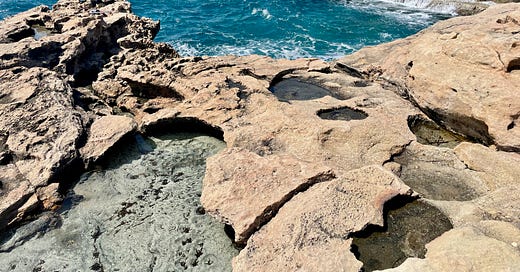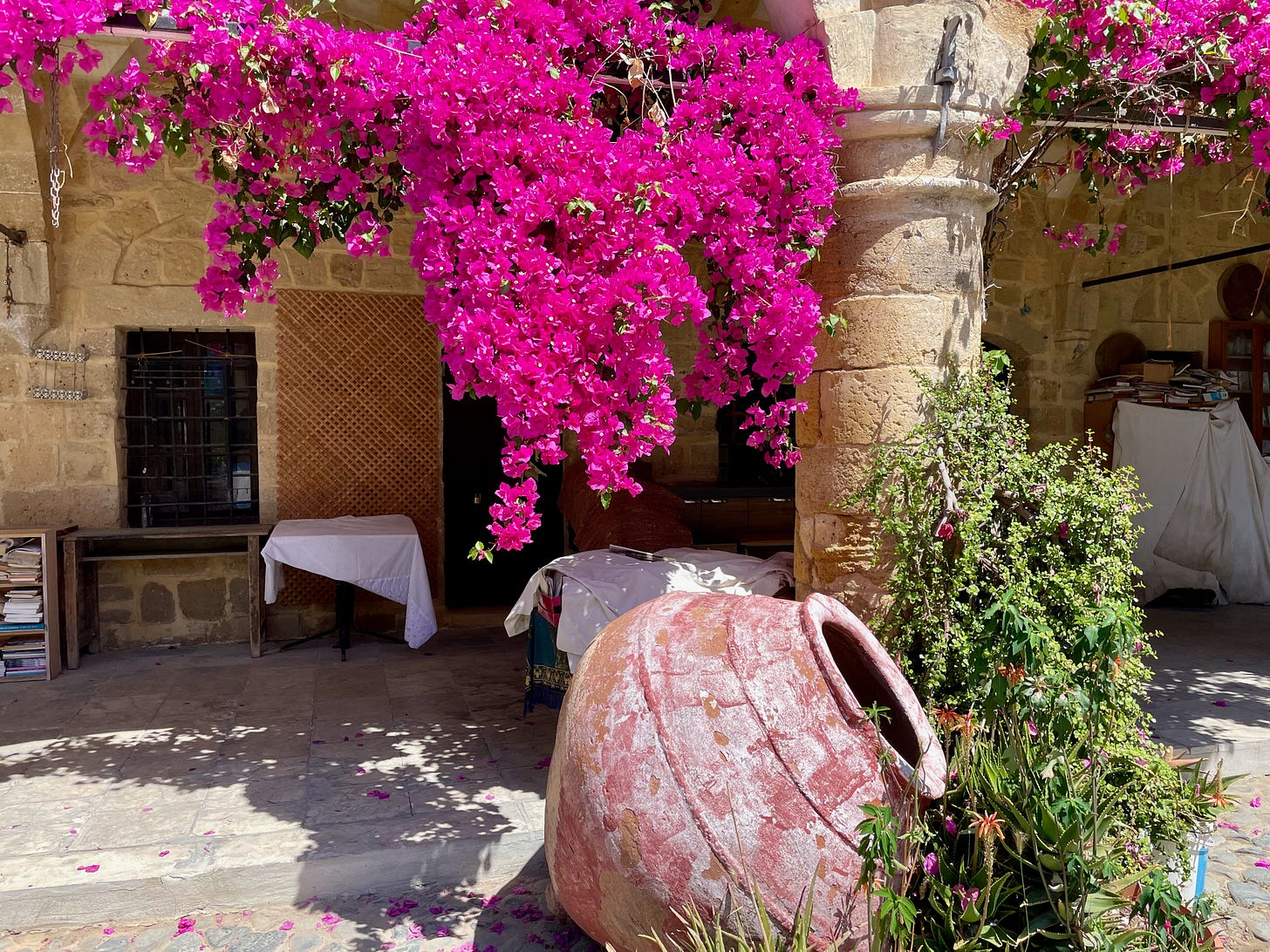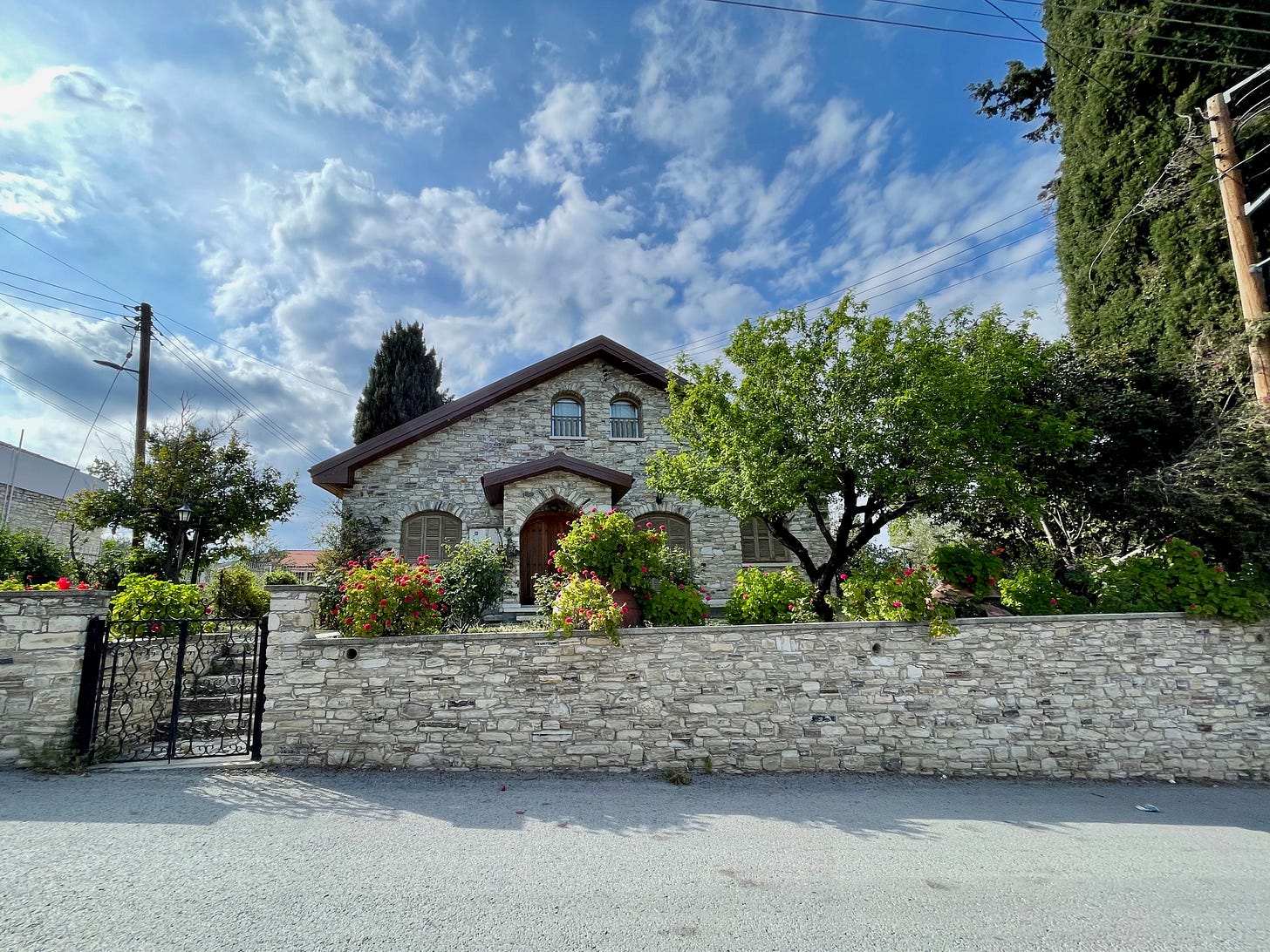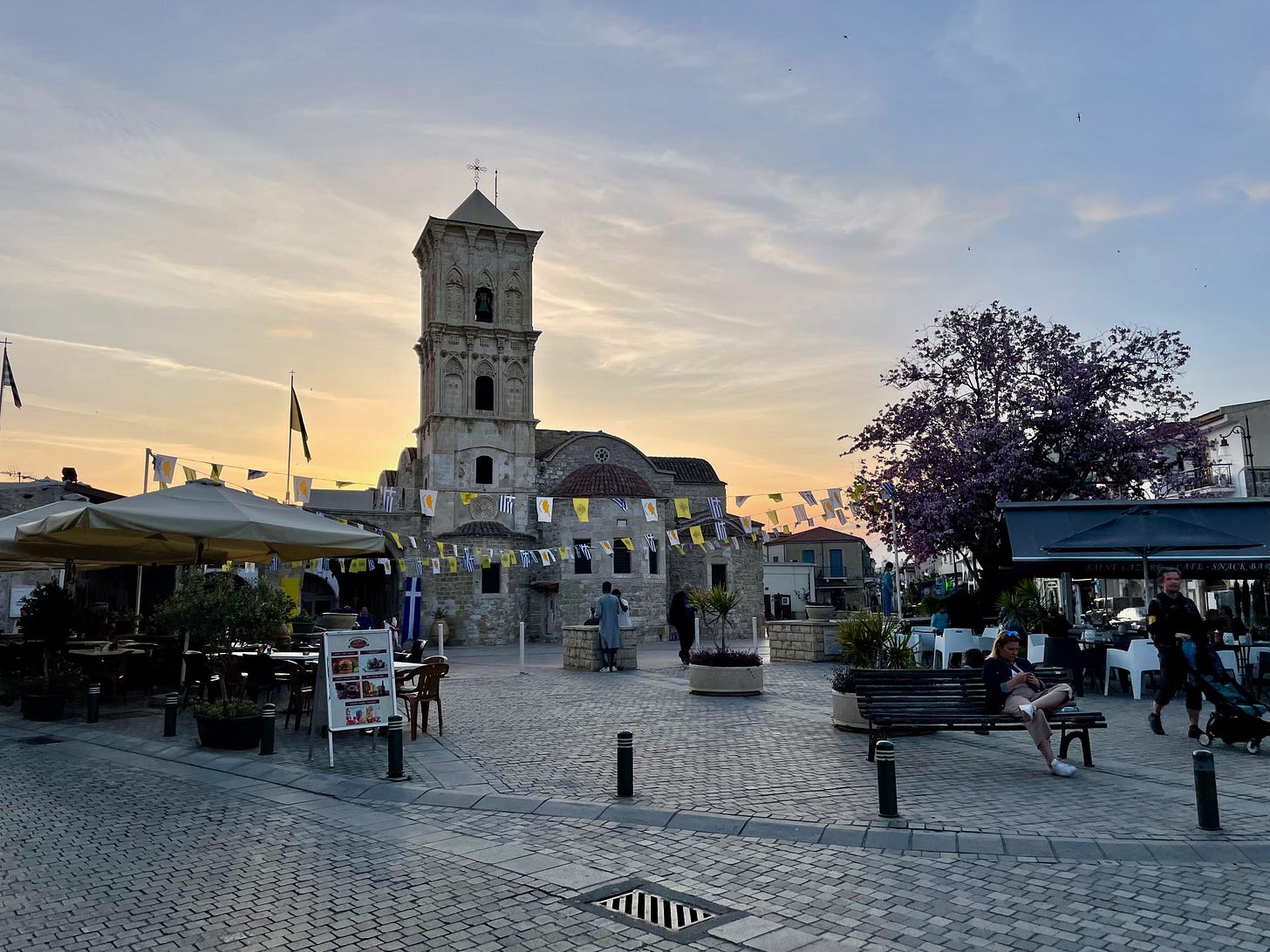Hi friends. I’ve been hard at work preparing a summer batch of paid travel guides for next week, and as I was working on one for Cyprus (it’s the perfect road trip! You’re going to love it!), I was reminded of this essay, one of my best. So, I have some old gold for you today, plus something new—below is a refreshed version of “The Arbitrariness of Borders,” with the addition of an audio component! Click above to listen to my reading of “The Arbitrariness of Borders.” And stay tuned for next week’s travel guides <3
Joan Didion, with whom I have a love-hate relationship (a relationship I suspect she, much like my third grade boyfriend, never really knew about) once said we tell ourselves stories to live.
I believe in this deeply. Stories bring order to the chaos and randomness of human experience. They extract sense from nonsense. But what happens when our old stories no longer serve us?
Here is a story I was told that turned out to be bullshit: when you lose someone, the anniversaries will be difficult. The one-year mark would be the hardest, people said. It would be a sort of coda, the end of a grace period unspoken and undefined, after which friends would no longer excuse my slipping away at parties with pitying whispers of “remember her dad just died.” Because of this, I remembered the exact date and time my father’s eyes closed forever, and held onto it like a mantra: April 22, 2022, 10:15 p.m.
April 22, 2023 happened to fall during Eid, and about a month prior, I told Nick it was imperative that we get the hell out of here for the holiday weekend. I’d been living hard for months, jetting around like I was trying to outrun something, consuming all the cities and cultures I could reach. Athens. Munich. The Maldives. Vienna. Luxor. Aswan. My journeys were stories I could make sense of, with a clear beginning, middle, and end, full of places to go, sights to see, items to check off the bucket list. I couldn’t let up now. No, another trip was all I needed.
I started looking for cheap tickets to anywhere, and I found it would take little over an hour to fly direct from Cairo to Larnaca, a sleepy seaside town in Cyprus. I knew nothing about Cyprus other than it was a Mediterranean island where there would be sunshine and pretty water, which were the only things I cared about. My cursory research revealed Cyprus’ history to be one of conquest and adventure; it had once been a stop for 12th century crusaders on their way to the Holy Land, and there was some sort of “cyclops cave,” which I assumed was where Odysseus blinded and tricked the one-eyed monster to save his intrepid crew.
I hoped I’d have an adventure there, too. I was on a mission to forget the timeline I was living in, and Cyprus would provide me another one to occupy.
Our plane landed in Cyprus at twilight. The Republic of Cyprus, that is. Larnaca is on the “Greek” side that occupies about two-thirds of the island, while the Turkish Republic of Northern Cyprus makes up the other third. The land felt like home to me—the dry-brush valleys and rocky shoreline looked so much like Northern California, where my father’s roots ran deep, and where he used to look up at the cloudless blue sky and ask why he’d ever want to live anywhere else.
Nick and I had decided to make this a road trip, so we picked up a Nissan Note so small and light you’d think the body was made of tin foil. I pulled out of the rental lot onto a two-lane highway, stuck the gas pedal to the floor, and watched as trucks and minivans flew past us. If only my dad could have seen me at the wheel. He used to joke that Priuses were the most anemic vehicles ever produced, and the Note would have made a Prius look like a Formula One car. We puttered down the road, finally reaching a causeway that led over the salt lake on the edge of town. A flock of flamingos stood in the shallows, which reflected the last streaks of sunset.
The next morning revealed Larnaca’s provincial charm: brightly painted doors and shutters, water tanks perched on the buildings’ roofs, a museum of salt and pepper shakers just around the corner from our hotel. Nick and I sipped our morning coffee in the main square, near the 1200-year-old limestone Church of Saint Lazarus. It was clear our walk to breakfast had shown us most of what there was to see in town, so we settled on driving north to Nicosia—“the last divided capital,” which straddles the island’s Greek and Turkish sides, a UN-controlled demilitarized zone dubbed the “Green Line” running through the heart of the city and cleaving it in half. We’d been told you feel like you are in another country immediately after stepping over the Green Line, and the temptation to cross was irresistible, even if only for the story.
Nicosia was shuttered and hushed when we arrived, the city still asleep at 11:00 a.m. We were the only tourists save for a couple buses of German retirees, who milled about aimlessly. Nick had found a website with a do-it-yourself walking tour of the Cypriot capital’s main attractions—the 16th century city walls, the monuments, the museums—and we completed the circuit in little over an hour. The only thing left was to cross to the Turkish side, so we walked to the checkpoint at the end of Ledra Street.
I often think about the arbitrariness of borders (I study wars, and if anything will show you just how ephemeral the lines on a map are, it is examining humans’ insatiable thirst to clobber each other over even the most barren slivers of land) but this border seemed the most arbitrary of all. There were no guns, no “YOU ARE NOW LEAVING…” signs to herald our exit, just a dead end on an unremarkable street in a mid-market shopping district, with discount shoe stores and ice cream shops and windows full of fake Hermes handbags. There was a cordoned line in front of the guard booth, as though we were queuing to buy tickets at a movie theatre, and Nick and I slid our passports into the little metal tray under the window. The border guard, whose name was Giorgios something or other, handed them back without stamping them and waved us on.
For the next fifty feet or so, we were in limbo. UN officials, who supposedly control the liminal space between the two Cypruses, were nowhere to be found. I thought about who would have jurisdiction if someone was murdered here, or what would happen if you lost your passport and the border guard who just checked it didn’t recognize you and refused to let you back in. Most of all, I thought about another threshold, that one-year anniversary I’d come here to forget. A few seconds later we were at the entry point to the Turkish side, and a border guard named Mehmet something something, who looked identical to Giorgios, again checked our passports and again did not stamp them.
We stepped over. It was as though we’d never crossed a border at all. Just like the Greek side, the streets were quiet, so quiet Nick and I kept asking each other if this was some sort of Potemkin village where no one actually lived. The language on the street signs had changed to Turkish and red flags with crescent moons flew from the balconies, but the architecture was the same, the flowers were the same. The same sun-faded goods sat unwanted in the windows of the same cheap, dated shops.
After wandering a few blocks and into a caravanserai, whose market stalls and restaurants were padlocked and dark, we returned to the Greek side, feeling as though we’d never left. We got back in the car and spent the rest of the afternoon driving east, where we hiked jagged sea cliffs with tidepools covered in films of crystallized salt.
The next day—April 22—we drove through the foothills of the Troodos Mountains toward the island’s western reaches. We planned to stop in Paphos, said to be the birthplace of the goddess Aphrodite, the catalyst for the Trojan War and The Iliad. We had crouched our way through the cyclops cave the day before, and this would complete our sightseeing tour of Homer’s works. With our eyes fixed on the open road, our conversation meandered to the structure of such epic tales.
“The defining feature of fantasy is the quest,” I said. “I mean, good stories in every genre have some sort of implicit quest. But in fantasy, it’s usually very explicit. Destroy the ring. Defeat Voldemort. That sort of thing.”
“True,” Nick said. “But the quest itself is the real fantasy. I’d rather have a clear, simple goal and know what I have to do—even if achieving it is almost impossible—than face the nothingness of reality.”
That walloped me. While he hadn’t intended it, Nick’s observation had shown me just how deluded I’d been to bring us here on my little crusade, to try and fight the windmill of my grief. I was not a hero and this was not an epic tale, and we would eventually go home and my dad would still be exactly as dead as he was now. Yet once the sting wore off, it was a freeing thought. If there was no real quest, there were no real rules and we could drift however we pleased, unencumbered by some grand plot.
We floated from Paphos, with its exquisite mosaics from antiquity, to Lefkara, a little village where we stuffed ourselves on souvlaki and fried celery leaves and cheeses wrapped in phyllo dough. Funnily enough, we later learned that the cyclops cave had been fake all along. No part of the Odyssey was set in Cyprus.
It was a beautiful hike anyway.
On our last day, as we sat in the hotel courtyard eating breakfast, I got a text from my mom:
7 more minutes
I looked at the clock: 8:08 a.m. California was 10 hours behind Cyprus, meaning it was still April 22 there, 10:08 p.m. We hadn’t crossed over yet.
“Are you okay?” Nick asked.
I wanted to say no because that’s what was expected of me—the catharsis, the flood of tears, the emotional release. But why bother making a scene that would change nothing? I was already a permanent resident on the island of loss and it didn’t matter which side I was on, how many phony boundaries I traversed. This was no different than the Green Line and the twin halves of Nicosia.
“Yes,” I answered, because the border is arbitrary. Because this story never ends.
















Your title drew me in, but your story did the magic. I mourn my father (gone for over 24 years) and my mother ( gone since 3 years) on moments I least expect it. They travel with me even if I don’t always pay them attention. I’m grateful for that.
Funny how borders are imaginary (for the most part) and there is no magic that happens when you cross them. It's the people and their beliefs that make a place unique. Borders can facilitate that by herding similar people into certain areas but doesn't mean that those lines aren't byproducts of our imagination.